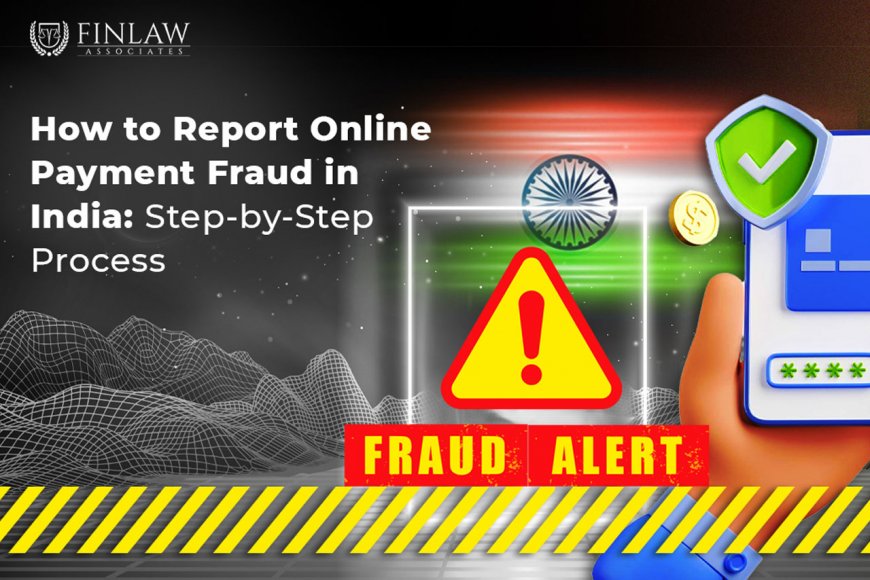How to Report Online Payment Frauds in India: Step-by-Step Process
Learn how to report online payment frauds in India with this step-by-step guide. Includes helplines, legal steps, and prevention tips.

Online payment frauds in India have seen a dramatic rise with the rapid adoption of digital banking, UPI transactions, mobile wallets, and cardless payments. While fintech innovation has made financial transactions easier, it has also opened new doors for fraudsters to exploit unsuspecting users.
If you've fallen prey to such scams or want to understand how to stay safe, this article provides a comprehensive, step-by-step guide on how to report online payment frauds in India, along with prevention tips, legal remedies, and frequently asked questions.
Understanding Online Payment Frauds in India
Online payment frauds occur when a person is deceived into transferring money digitally under false pretenses. These crimes are often committed using phishing emails, fraudulent payment links, UPI scams, fake websites, or identity theft.
Common Types of Online Payment Frauds in India
|
Type of Fraud |
Description |
|
Phishing and Smishing |
Emails/SMS from fake bank sources asking for confidential info. |
|
Fake UPI Collect Requests |
Scammers send “Request Money” via UPI apps disguised as refund or prize offers. |
|
QR Code Fraud |
Victims are told to scan a QR code that results in money deduction. |
|
Remote Access Apps |
Fraudsters trick victims into installing apps like AnyDesk or TeamViewer to take control of phones. |
|
Online Shopping Frauds |
Fake websites or sellers collect money and disappear without delivery. |
|
Loan or Job Scams |
Fraudulent links offering instant loans or work-from-home jobs in exchange for upfront fees. |
Step-by-Step Process to Report Online Payment Frauds in India
If you detect unauthorized transactions or believe you have been defrauded, act quickly using the following steps:
1. Immediately Notify Your Bank or Payment App
Time is critical. Contact your bank or payment platform (like PhonePe, Google Pay, Paytm) without delay.
-
Use customer helpline or raise a complaint via net banking/app.
-
Block your card, wallet, or UPI ID if compromised.
-
Ask for an acknowledgment or complaint ID.
According to RBI guidelines, reporting the fraud within three working days minimizes your financial liability.
2. Call the National Cyber Crime Helpline – 1930
Dial 1930, a dedicated toll-free number launched by the Ministry of Home Affairs for reporting cyber-enabled financial frauds.
-
Available from 9 AM to 6 PM on working days.
-
Your complaint is routed in real-time to the relevant police authority.
-
Early reporting increases the chance of freezing the beneficiary's bank account and recovering funds.
3. File a Complaint on the Cyber Crime Reporting Portal
Visit: https://cybercrime.gov.in
Steps to report online:
-
Click on ‘Report Other Cyber Crimes’ > Continue.
-
Log in with your mobile number and OTP.
-
Select ‘Financial Fraud’.
-
Fill in transaction details, attach screenshots, and provide ID proof.
-
Submit and save your complaint ID for future follow-up.
This portal connects victims directly with the Indian Cyber Crime Coordination Centre (I4C) and local law enforcement units.
4. Visit a Cyber Crime Police Station or Local Police Station
Not all cyber crime complaints get resolved online. If necessary:
-
Visit your nearest Cyber Crime Cell (found in most Tier I and II cities).
-
In rural areas, file an FIR at your local police station.
Carry the following:
-
Proof of transaction (bank statement or UPI history)
-
Screenshots of messages/emails/links
-
Your government ID proof
-
Any phone numbers or contact details used by fraudsters
Request registration under relevant sections of the IT Act and IPC.
5. Escalate to RBI Ombudsman (If the Bank Doesn’t Respond)
If your bank refuses or delays action, file a complaint with the RBI’s Complaint Management System (CMS):
Visit: https://cms.rbi.org.in
Provide:
-
Copy of your bank complaint
-
Bank’s response (if any)
-
Transaction details
The Banking Ombudsman may direct your bank to refund the amount and take corrective action.
Legal Protection Against Online Payment Frauds in India
Several laws help victims seek redressal and punish fraudsters:
|
Law/Act |
Description |
|
IT Act, 2000 – Section 66C |
Punishes identity theft including online impersonation. |
|
IT Act, 2000 – Section 66D |
Addresses cheating via electronic communication. |
|
IPC Section 419 & 420 |
Impersonation and cheating (up to 7 years of imprisonment). |
|
Section 43A of IT Act |
Ensures companies protect customer data and secure payment systems. |
You can cite these sections when filing your FIR or legal complaint.
RBI Guidelines on Customer Liability in Digital Transactions
RBI issued circulars that clearly define customer liability in case of unauthorized electronic transactions:
|
Scenario |
Customer’s Liability |
|
Reported within 3 working days |
Zero liability |
|
Between 4-7 days |
Limited liability (₹5,000–₹25,000 depending on account type) |
|
After 7 days |
Full liability |
Important: Always keep transaction alerts on and regularly check your statements to detect frauds early.
Preventive Measures to Avoid Online Payment Frauds in India
Staying vigilant is the first line of defense. Follow these dos and don’ts:
Best Practices:
-
Use strong, unique passwords for banking and payment apps.
-
Always log out from net banking after use.
-
Regularly update your UPI app and operating system.
-
Activate transaction alerts for SMS and email.
-
Use official apps only from Google Play Store or Apple App Store.
Avoid:
-
Sharing OTPs, CVVs, or card details—even with people posing as bank officials.
-
Clicking on suspicious links or downloading unverified apps.
-
Scanning QR codes from unknown sources.
-
Making advance payments to unknown merchants or freelancers.
Trusted Portals and Helplines for Victims
|
Resource |
Purpose |
Link |
|
Cyber Crime Portal |
Report financial cyber crimes |
|
|
RBI CMS |
Escalate unresolved banking frauds |
|
|
RBI Sachet Portal |
Report financial fraud schemes |
|
|
1930 Helpline |
National emergency helpline for payment frauds |
Dial 1930 |
|
NPCI |
Report UPI-based frauds and merchant disputes |
Frequently Asked Questions (FAQs)
1. Can I recover money lost in an online payment fraud?
If reported quickly (within 3 days), banks can reverse the amount or freeze the beneficiary account. Delayed reporting may reduce chances of recovery.
2. Is online payment fraud a criminal offense in India?
Yes. It is punishable under the IT Act and Indian Penal Code, which includes penalties like fines and imprisonment.
3. Can I file a complaint without knowing the scammer’s details?
Yes. Provide whatever information you have—transaction ID, phone number, app name, or screenshots. Authorities can trace IP addresses or account holders.
4. How long does it take to resolve such complaints?
It can take from a few days to several weeks depending on the severity, evidence, and involvement of multiple jurisdictions.
Final Words
Online payment frauds in India are a growing menace, but the government, RBI, and law enforcement have made strong efforts to curb the problem through timely intervention and grievance redressal systems.
If you or someone you know is a victim:
-
Don’t panic. Act fast. Report it.
-
Your prompt action can prevent further loss and possibly help authorities catch the fraudsters.
Remember: Cyber safety is your digital right, and staying informed is your best defense. If needed, consult with a cybercrime lawyer.
What's Your Reaction?















